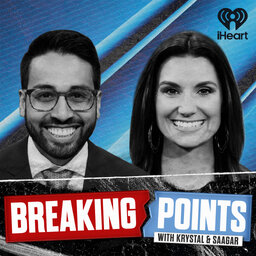9/24:24: Nebraska Saves Kamala, Trump Too Old For Rallies, Trump Takes Bernie Policy, How CIA Propped Up Afghan Heroin
Krystal and Saagar discuss Nebraska election rule could save Kamala, Trump too old for 2016 rally pace, Trump takes Bernie credit card policy, how CIA propped up Afghanistan drug trade.
To become a Breaking Points Premium Member and watch/listen to the show AD FREE, uncut and 1 hour early visit: https://breakingpoints.com/
Merch Store: https://shop.breakingpoints.com/
In 1 playlist(s)
Breaking Points with Krystal and Saagar
Breaking Points is a fearless anti-establishment multi-week Youtube and Podcast which holds the powe…Social links
Follow podcast
Recent clips

1/22/26: Trump Caves On Greenland, John Mearsheimer On Greenland, Iran & MORE!
1:01:41

1/22/26: SCOTUS To Defeat Trump On Fed, DOGE Election Fraud, FanDuel Lies, MN Family Teargassed
59:14

1/21/26: Trump Demands Greenland At Davos, Canada Breaks With US, Market Tank, MN Cops Vs ICE
1:23:05
 Breaking Points with Krystal and Saagar
Breaking Points with Krystal and Saagar